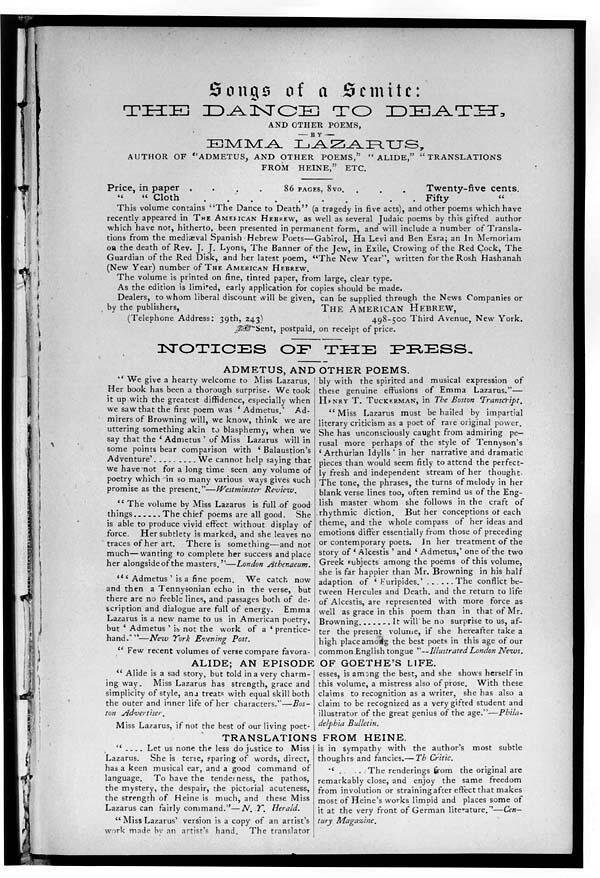Advertisement Featuring Reviews of Emma Lazarus
An advertisement featuring reviews of Emma Lazarus's work.
The text of the advertisement reads as follows:
Courtesy of the Arthur and Elizabeth Schlesinger Library on the History of Women in America, Radcliffe Institute for Advanced Study at Harvard University.
Songs of a Semite:
The Dance to Death,
And Other Poems,
By
Emma Lazaurs,
Author of "Ademetus, and Other Poems," "Alide," "Translations from Heine," Etc.
Price, in paper $6 Pages, 8 vo. Twenty-five cents.
"" [Price, in] Cloth Fifty "" [cents]
This volume contains "The Dance to Death" (a tragedy in five acts), and other poems which have recently appeared in The American Hebrew, as well as several Judaic poems by this gifted author which have not, hitherto, been presented i permanent form, and will include a number pf Translations from the medieval Spanish Hebrew Poets--Gabirol, Ha Levi and Ben Esra; an In Memoriam on the death of Rev. J. J. Lyons, The Banner of the the Jew, in Exile, Crowing of the Red Cock, The Guardian of the Red Disk, and her latest poem, "The New Year", written for the Rosh Hashanah (New Year) number of The American Hebrew.
The volume is printed on fine, tinted paper, from large, clear type.
As the edition is limited, early application for copies should be made.
Dealers, to whom liberal discount will be given, can be supplied through the News Companies or by the publishers The American Hebrew, (Telephone Address: 39th, 243) 498-500 Third Avenue, New York.
20 cent, postpaid, on receipt of price.
Notices of the Press.
Admetus, and Other Poems.
"We give a hearty welcome to Miss Lazarus. Her book has been a thorough surprise. We took it up with the greatest diffidence, especially when we saw that the first poem was 'Admetus.' Admirers of Browning will, we know, think we are uttering something akin to blasphemy, when we say that the 'Admetus' of Miss Lazarus will in some points bear comparison with 'Balaustion's Adventure'.........We cannot help saying that we have not for a long time seen any volume of poetry which in so many various ways gives such promise as the present."––Westminster Review.
"The volume by Miss Lazarus is full of good things......The chief poems are all good. She is able to produce vivd effect without display of force. Her subtlety is marked, and she leaves no traces of her art. There is something--and not much--wanting to complete her success and place her alongside of the masters."--London Athenaeum.
"'Admetus' is a fine poem. We catch now and then a Tennysonian echo in the verse, but there are no feeble lines, and passages both of description and dialogue are full of energy. Emma Lazarus is a new name to us in American poetry, but 'Admetus' is not the work of a 'prenticehand.'"--New York Evening Post.
Few recent volumes of verse compare favorably with the spirited and musical expression of these genuine effusions of Emma Lazarus." --Henry T. Tuckerman, in The Boston Transcript.
"Miss Lazarus must be hailed by impartial literary criticism as a poet of rare original power. She has unconsciously caught from admiring perusal more perhaps of the style of Tennyson's 'Arthurian Idylls' in her narrative and dramatic pieces than would seem fitly to attend the perfectly fresh and independent stream of her though. The tone, the phrases, the turns of melody in her blank verse lines too, often remind us of the English master whom she follows in the craft of rhythmic diction. But her conceptions of each theme, and the whole compass of her ideas and emotions differ essentially from those of preceding or contemporary poets. In her treatment of the story of 'Alcetis' and 'Admetus,' one of the two Greek subjects among the poems of this volume, she is far happier than Mr. Browning in his half adaption of 'Euripides,'......The conflict between Hercules and Death, and the return to life of Alcestis, are represented with more force as well as grace in this poem than in that of Mr. Browning......It will be no surprise ti ys, after the present volume, if she hereafter take a high place among the best poets in this age of our common English tongue."--Illustrated London News.
Alide; An Episode of Goethe's Life.
"Alide is a sad story, but told in a very charming way. Miss Lazarus has strength, grace and simplicity of style, and treats with equal skill both the outer and inner life of her characters."--Boston Advertiser.
Miss Lazarus, if not the best of our living poetesses, is among the best, and she shows herself in this volume, a mistress also of prose. With these claims to recognition as a writer, she has also a claim to be recognized as a very gifted student and illustrator of the great genius of the age.'--Philadelphia Bulletin.
Translations from Heine.
"....let us none the less do justice to Miss Lazarus. She is terse, sparing of words, direct, has a keen musical ear, and a good command of language. To have the tenderness, the pathos, the mystery, the despair, the pictorial acuteness, the strength of Heine is much, and these Miss Lazarus can fairly command."--N.Y. Herald.
"Miss Lazarus' version is a copy of an artist's work made by an artist's hand. The translator is in sympathy with the author's most subtle thoughts and fancies.--The Critic.
"......The renderings from the original are remarkably close, and enjoy the same freedom from involution or straining after effect that makes most of Heine's works limpid and places some of it at the very front of German literature."--Century Magazine.



